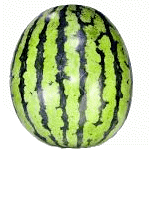 
"Math: the only place where people buy 60 watermelons and no-one wonders why!" I was visiting once again, and was watching Mildred's little brother George working on his math homework. They always seemed to be working on math homework when I visited. Not that I minded, but it would have been nice to help with science once in a while. Or maybe Language Arts; I was good at that! I should mention that George, like his big sister, is very smart. He also questions everything! He had a question for me now. "Uhhh ... 'Retired Math Teacher' ... I mean, Grandpa ..." I was wearing my cape. It was cold out, alright?! "Yes, George? I see you're working on word problems!" George was in grade two. Math was his favourite subject. After recess. "Yeah. And I have a question for you. Something has always bothered me about math word problems. I find them literally unrealistic!"  I should have mentioned that George has the vocabulary of an adult. It can be very disconcerting sometimes. Although he does use the word 'literally' too much.
I should have mentioned that George has the vocabulary of an adult. It can be very disconcerting sometimes. Although he does use the word 'literally' too much."What do you mean, George?" "Well, look at this problem my teacher assigned": 'Justin's mother bought sixty watermelons and when she got home, she discovered that she'd lost twelve of them. How many did she have left?'"Who buys sixty watermelons?!!" George exclaimed. "And how do you lose twelve of them without noticing?! That's literally impossible!" Mildred had come into the room while George was literally complaining." I know what you mean! It's the same in my grade seven class. Today we had to add 3.57 apple pies to 11.6 apple pies. Who adds apple pies? Who has that many? How would you even measure point five seven of a pie??" "Literally!" chimed in George. I figured it was my turn. "You're right ... it is silly. But math is used in a lot of important places, and you have to know a LOT of math to use it properly". They both were listening. "When you're first learning how to do math, like subtracting numbers in grade two, or adding decimals in grade seven, the problems have to be simple, using things you can understand". "But watermelons??" from George. "OK, here's an example. In grade 9 math you learn about percents and ratios. But suppose the teacher tried to explain them using this problem": "A solution contains 10.0 g of cobalt(II) chloride dihydrate, CoCl2•2H2O, in enough ethanol to make exactly 500 mL of solution. What is the molar concentration of CoCl2·2H2O?""This is a pretty simple chemistry problem involving ratios and a formula," I continued, "but students who haven't taken Chemistry 30, or for that matter, any previous chemistry course, won't even understand the problem. The specal chemistry words will prevent them from being able to solve it". "So teachers make up a simpler problem using watermelons!" Mildred exclaimed. She got it! "They're called 'analogies'. Teachers have to use them because most of the math in school, up to about grade eleven, is all about learning to use math tools. You don't actually use them to solve real problems! Students can't begin to solve a problem involving real concepts from engineering, physics, or chemistry, if they don't understand the problem in the first place." "So teachers use watermelons instead!" That was George. He got it too! "That's right. So you'll see problems like this": "Mary's order of three bottles of shampoo and five bottles of conditioner cost $51. Edith's order of seven bottles of shampoo and one bottle of conditioner cost $39. What is the price of one bottle of each?""It deals with something everyone can understand. While no-one would ever use math to solve this problem outside of school, a good math teacher will explain to students that the problem is an analogy, substituting a familiar situation for a real-life one which may be too complicated to understand without special knowledge". Mildred went back to cleaning her room, and George went back to his homework. But he had this comment: "You must be pretty smart, Grandpa. You know all about math, but you know chemistry too!" I didn't say anything. I was smart enough not tell him about my brief fling with chemistry that nearly killed me. Literally! |